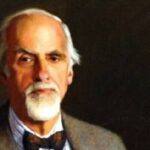Great Man Theory of Leadership

Great Man Theory of Leadership: this article provides a practical explanation of the Great Man Theory of leadership. Next to what it (definition and origin) is, this article also highlights an overview of the theory, famous examples of great man theory leaders and debunking. After reading, you’ll have a basic understanding of this leadership philsophy and theory. Enjoy reading!
What is the Great Man Theory of Leadership?
The definition
The Great Man Theory of leadership refers to an idea dating back to the 19th century. According to this idea, history and everything that’s happened in the world and the history of the world can be explained by identifying the impact that great men or heroes have had. This concerns highly influential and unique individuals who’ve had a decisive historical effect.
Origin: who created the Great Man theory?
The development of the theory is mainly credited to Scottish philosopher and historian Thomas Carlyle. In 1840, he gave a series of lectures on heroes and heroism and later published various pieces, including Hero Worship and The Heroic in History.
In them, he commented on great men or heroes from history. According to him, a leader is a person who is blessed with unique qualities from birth in positions of power that capture the masses’ imagination. Thomas Carlyle said that ‘the history of the world is but the biography of great men’.
Essentially, according to this theory, people in positions of power deserve to lead the world, because of the characteristics that were given to them at birth, which ultimately help them become heroes.
Great Man Theory of leadership: Overview
Why is it that some men or women rise above others? And why is it that a specific family can produce multiple highly successful leaders? For most people, the answers to these questions is a mystery. Some theorists, however, claim that these questions have already been answered by the Great Man Theory.
In short, this theory of leadership posits that great leaders are born, not made or trained.
Individuals are born with certain traits or characteristics, and these characteristics are different in natural-born leaders compared to others or are only present in such leaders. These specific traits or characteristics enable them to lead people while they shape the pages of history.
The special characteristics leaders in general and great leaders in particular are born with that others don’t have include: charm, intelligence, intuition, judgement, courage, aggressiveness, persuasion, etc.
According to Thomas Carlyle, these can’t be learned; someone either possesses these traits or doesn’t.
Such characteristics are fixed in the family’s genes and are passed on from generation to generation.
What are examples of great man theory leaders?
Examples of great leaders that also had these characteristics are: Mao Zedong, Gandhi, Abraham Lincoln, Mahatma Gandhi, Alexander the Great, Adolf Hitler etc.
These people are credited with having innate qualities and divine inspiration that helped them reach great heights.
They weren’t trained in leadership nor were they given the opportunity to improve their leadership skills during their lives. Something in their anatomy, personality or physiology set them apart from the common folk.
Furthermore, the instinctive drive to take on leadership roles is thought to have made these great men successful. Others turned to them for inspiration, support and comfort.
What is the difference between great man theory and trait theory?
According to the Great Man Theory of leadership, leaders are God’s gift to humanity. No one would be able to become great if there is no such thing as innate leadership traits. The Great Man Theory can be compared to the idea that kings have a divine right to rule and govern their subjects. This divine right is inherited by their descendants.
The Great Man Theory of leadership dates back to the times of the ancient Greek and Romans. Back then, leadership was correlated with unique, specific mental, physical or personal characteristics. Because leadership couldn’t be learned or taught, a certain level of divinity was attributed to them.
Great Man Theory of Leadership and debunking
The famous philosopher, sociologist, political theoretician, biologist and sociologist Herbert Spencer refuted the Great Man Theory and called it childish, primitive and certainly not scientific. He assumed that leaders were products of their environment and argued that great personalities are formed by society.
In a sociology magazine, Spencer wrote that it depends on a long series of complex influences that shape a great personality. Despite his ideas and arguments, the Great Man Theory remained very popular and a leading argument in research into leadership.
Another important rebuttal of the theory is the fact that there are effective leaders who don’t possess these so-called natural leadership characteristics. If leadership was an innate quality or characteristic, everyone with these characteristics would end up in a leading position. Instead, however, research has shown that leadership is a highly complex matter and that countless factors influence the level of success a person will achieve.
Furthermore, the Great Man Theory doesn’t include any scientific or verifiable explanations on how or when great leaders arise and become effective, what the required critical characteristics are, and why out of two equal leaders one fails.
Now It’s Your Turn
What do you think? Do you recognise the explanation of the Great Man Theory? Do you believe that the ability to become a good leader is captured in a person’s genes? What do you think are characteristics of a good leader? Do you agree with the above, or do you have anything to add?
Share your experience and knowledge in the comments box below.
More information
- Spector, B. A. (2016). Carlyle, Freud, and the great man theory more fully considered. Leadership, 12(2), 250-260.
- Eckmann, H. L. (2005). Great Man Theory: A personal account of attraction. In PAPER FOR THE IBA CONFERENCE. San Diego: National University.
- Allio, R. J. (2012). Leaders and leadership–many theories, but what advice is reliable?. Strategy & Leadership, 41(1), 4-14.
How to cite this article:
Janse, B. (2019). Great Man Theory of Leadership. Retrieved [insert date] from toolshero: https://www.toolshero.com/leadership/great-man-theory/
Original publication date: 12/05/2019 | Last update: 08/23/2023
Add a link to this page on your website:
<a href=”https://www.toolshero.com/leadership/great-man-theory/”>Toolshero: Great Man Theory of Leadership</a>












